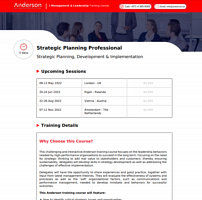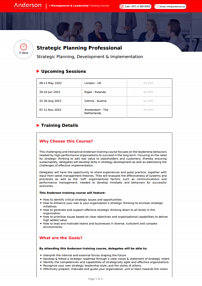- Course Finder
- Formats
- Training Topics
- Business Strategy
- Management & Leadership
- Personal Development Skills
- Innovation & Creativity
- Emotional Intelligence
- Governance and Compliance
- Business & Life Synergy
- Business Agility
- Business Sustainability
- Executive & Administrative Support
- Customer Service
- Sales & Marketing
- Human Resource HR Management
- Finance & Budgeting
- Data Science and Protection
- Project Management
- CertNexus
- Special Courses
- 10 Day Seminars
- The Essential Skills
- The Advanced Skills
- The Mini MBA Series
- Bootcamps
- Training Venues
-
- Certificates
- Calendars
- About us
- الدورات العربية
We currently have no scheduled session for this Training Course. If you are interested in running this course, please contact our Training Department at info@anderson.ae
The Structure
This comprehensive Anderson training course consists of two modules which can be booked as a 10-Day Training event, or as individual, 5-Day training courses.
Module 1: Performance Measurements, Continuous Improvement & Benchmarking
Day One: Performance Measurement: The Starting Point for Improvement
- The Need for Measurement
- Data Use and Abuse: Using Data Constructively
- Methods of Selecting Performance Measures
- Developing a Framework for Measurement
- Understanding Variation: The key to understanding performance
- What histograms, run charts and control charts tell us about performance
Day Two: Continuous Improvement
- Understanding Variation: The Range and Standard Deviation
- Taking Appropriate Action against a Process
- An Introduction to Control Charts
- How to Improve a Process
- The Power of Teamwork
- Problem and Mission Statements
Day Three: The Tools of Continuous Improvement
- Understanding and Analyzing a Process
- Identifying causes of problems, and potential solutions
- Demonstrating the link between a cause and its effect
- Understanding the Process
- Investigating Relationships between Variables
Day Four: An Introduction to Benchmarking
- What is benchmarking?
- History of benchmarking
- Different Methods of benchmarking and how they relate to each other
- How to identify potential benchmarking projects
- An overview of the benchmarking process
- Selecting your first project
Day Five: Running a Successful Benchmarking Project
- Scoping and planning benchmarking study
- Identifying and selecting benchmarking Metrics & Partners
- Participant meetings: Planning and running effective meetings to attain the aims of the study
- Benchmarking project management
- Management support activities
- Legal issues
Module 2: Managing Multiple Tasks, Priorities & Deadlines
Day Six: Introduction of Work Task Concepts
- Understanding the role of self-management in managing tasks
- Overview and context of task management
- Identifying reasons for the current focus in business on managing tasks
- Understanding how work is accomplished in organizations
- Identifying the role of strategic management in leadership of tasks
- Understanding the role of organization type in task management
Day Seven: Importance of Planning in Management of Tasks
- Clarifying goals, objectives, assumptions and constraints in work
- Integrating a scope, work structure and management plan in assignments
- Learning to identify and manage stakeholders
- Identifying risk techniques that affect tasks, priorities and deadlines
- Understanding how to develop clarity of purpose and objectives in task assignments
- Identifying the skills necessary to lead and manage work tasks
Day Eight: Setting Priorities & Deadlines in our Time Management
- Using the manner we approach work as an initial time management plan
- Planning for time management, scheduling and meeting deadlines
- Integrating time management into development of priorities
- Making the most from meetings, e-mails, interruptions and transition time
- Developing a personal plan, with a ‘to do’ list and priorities
- Dealing with time wasters, procrastination and bosses
Day Nine: Skills Required to Deal with People in our Work Assignments
- Identifying skills required to obtain the help of others on tasks
- The importance of understanding our ways of working with others
- The importance of interpersonal skill in accomplishment of tasks
- Identifying interpersonal work styles of self and other
- Understanding task flexibility and versatility in people leadership
- Learning how to work better with others to have productive work
Day Ten: Personally Managing Tasks to Implement Change
- Learning techniques to use communication for success in tasks
- Understand the characteristics of proper communication
- Identifying methods to deal with human change patterns
- Developing a personal plan to become more effective with self-management
- Dealing with some people who struggle with change
- Practicing techniques to help colleagues with change
- Anderson Certificate of Completion will be provided to delegates who attend and complete the course
The Structure
This comprehensive Anderson training course consists of two modules which can be booked as a 10-Day Training event, or as individual, 5-Day training courses.
Module 1: Performance Measurements, Continuous Improvement & Benchmarking
Day One: Performance Measurement: The Starting Point for Improvement
- The Need for Measurement
- Data Use and Abuse: Using Data Constructively
- Methods of Selecting Performance Measures
- Developing a Framework for Measurement
- Understanding Variation: The key to understanding performance
- What histograms, run charts and control charts tell us about performance
Day Two: Continuous Improvement
- Understanding Variation: The Range and Standard Deviation
- Taking Appropriate Action against a Process
- An Introduction to Control Charts
- How to Improve a Process
- The Power of Teamwork
- Problem and Mission Statements
Day Three: The Tools of Continuous Improvement
- Understanding and Analyzing a Process
- Identifying causes of problems, and potential solutions
- Demonstrating the link between a cause and its effect
- Understanding the Process
- Investigating Relationships between Variables
Day Four: An Introduction to Benchmarking
- What is benchmarking?
- History of benchmarking
- Different Methods of benchmarking and how they relate to each other
- How to identify potential benchmarking projects
- An overview of the benchmarking process
- Selecting your first project
Day Five: Running a Successful Benchmarking Project
- Scoping and planning benchmarking study
- Identifying and selecting benchmarking Metrics & Partners
- Participant meetings: Planning and running effective meetings to attain the aims of the study
- Benchmarking project management
- Management support activities
- Legal issues
Module 2: Managing Multiple Tasks, Priorities & Deadlines
Day Six: Introduction of Work Task Concepts
- Understanding the role of self-management in managing tasks
- Overview and context of task management
- Identifying reasons for the current focus in business on managing tasks
- Understanding how work is accomplished in organizations
- Identifying the role of strategic management in leadership of tasks
- Understanding the role of organization type in task management
Day Seven: Importance of Planning in Management of Tasks
- Clarifying goals, objectives, assumptions and constraints in work
- Integrating a scope, work structure and management plan in assignments
- Learning to identify and manage stakeholders
- Identifying risk techniques that affect tasks, priorities and deadlines
- Understanding how to develop clarity of purpose and objectives in task assignments
- Identifying the skills necessary to lead and manage work tasks
Day Eight: Setting Priorities & Deadlines in our Time Management
- Using the manner we approach work as an initial time management plan
- Planning for time management, scheduling and meeting deadlines
- Integrating time management into development of priorities
- Making the most from meetings, e-mails, interruptions and transition time
- Developing a personal plan, with a ‘to do’ list and priorities
- Dealing with time wasters, procrastination and bosses
Day Nine: Skills Required to Deal with People in our Work Assignments
- Identifying skills required to obtain the help of others on tasks
- The importance of understanding our ways of working with others
- The importance of interpersonal skill in accomplishment of tasks
- Identifying interpersonal work styles of self and other
- Understanding task flexibility and versatility in people leadership
- Learning how to work better with others to have productive work
Day Ten: Personally Managing Tasks to Implement Change
- Learning techniques to use communication for success in tasks
- Understand the characteristics of proper communication
- Identifying methods to deal with human change patterns
- Developing a personal plan to become more effective with self-management
- Dealing with some people who struggle with change
- Practicing techniques to help colleagues with change
The Certificate
-
Anderson Certificate of Completion will be provided to delegates who attend and complete the course
Info & In-house Solution
For more information about this course, call or email us at:
Call us: +971 4 365 8363

